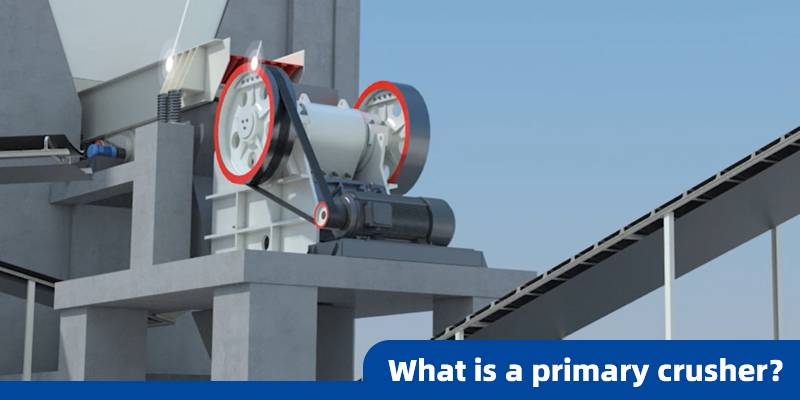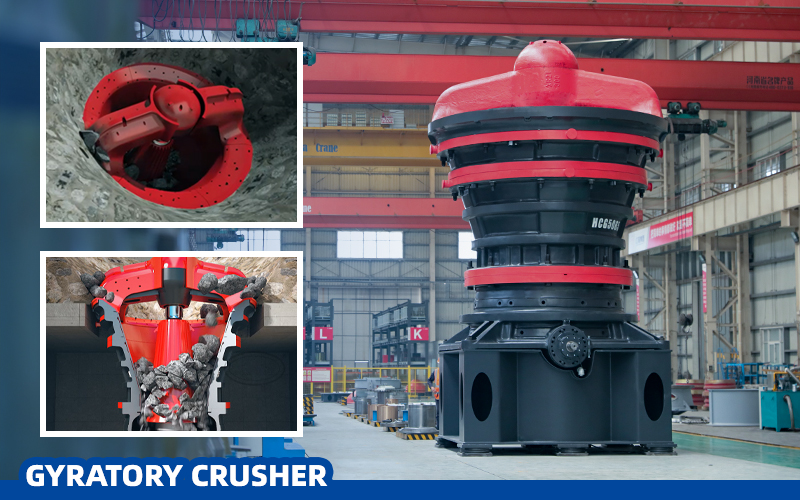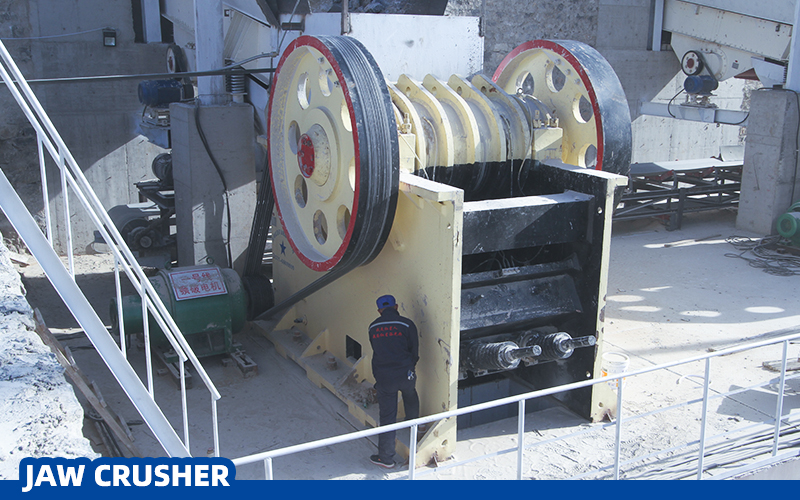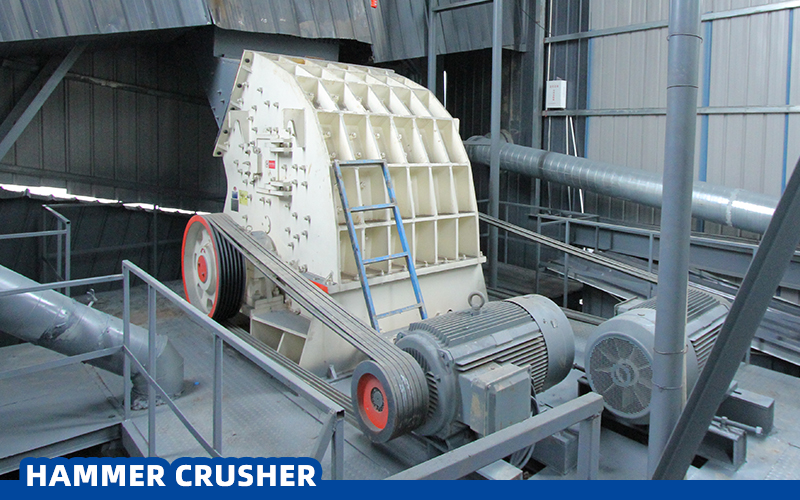An ideal primary crusher can not only handle the toughest materials with ease, but also ensure a stable high output.
In this article, FTM Machinery introduces different types of primary crushers, their working principles, and advantages to help you choose the best one for your needs, transforming your operations and staying ahead of the competition.
What is a primary crusher?
A primary crusher is a machine used to perform preliminary, rough crushing of large pieces of hard materials such as rocks, ores, concrete, etc., reducing the material to a size suitable for further processing or disposal.
It is commonly used in the mining, construction and recycling industries.

Feeding large materials directly into secondary or tertiary crushers causes severe wear and high maintenance costs. Therefore, primary crushing as the first stage provides a better foundation for subsequent secondary, tertiary, or even quaternary crushing.
Types of primary crushers
The most common types of primary crushers:
- Gyratory crusher
- Jaw crusher
- Hammer crusher
1. Gyratory crusher
Gyratory crushers are designed for medium to high hardness rocks, ores and corrosive materials. They are good at handling dry to slightly wet materials, but not very suitable for sticky materials.
They perform well in large-scale mining, construction, building materials, chemical and other industries.
Gyratories feature a large crushing chamber that allows continuous operation and supports full feed without pre-screening or removing fines.

Their feed opening is 15% larger than similar crushers, handling feed sizes up to 1350 mm, with a reduction ratio of 8:1, producing fine needle-like particles.
Using an eccentric shaft to create rotational movement, the machines efficiently compress and crush materials. The crushed material is discharged by gravity from the bottom of the chamber, completing the process.
- High capacity: A processing capacity of 2000–10000 TPH.
- Low energy consumption: Large and medium-sized gyratory crushers consume less energy than the same types of jaw crushers.
- Low maintenance: Even wear distribution reduces liner replacements and maintenance costs.
- Environmental performance: Fully enclosed design with excellent sealing ensures superior environmental protection.
Gyratory crushers typically have a higher initial investment cost due to their complex structure and large size of the outer shell.
2. Jaw crusher
Whether it is hard rock or soft material, jaw crushing machines provide stable crushing performance.
These compression crushers perform better with high moisture and high viscosity materials like clay, with a reduction ratio of 6:1. They operate intermittently and require even feeding from a feeder.

Renowned for reliability and cost-effectiveness, jaw crushers are the primary crusher choice across various industries:
- Mining: Primary crushing of iron ore, copper ore, gold ore, and other metal ores.
- Construction: Preprocessing of limestone, concrete, and other construction materials.
- Chemical and building materials: Initial crushing of gypsum, coal, ceramic raw materials, etc.
The working principle involves compressing material between a moving jaw plate and a fixed jaw plate, crushing it and then discharging it through the bottom opening.
- Simple operation: Jaw crushers are easy to operate, even for beginners.
- Lower cost: Compared to gyratory crushers, they require less investment, saving money.
- Easy maintenance: Liners are easy to replace, with minimal downtime and a small footprint.
If you have no idea whether to choose a gyratory crusher or a jaw crusher, consider the following guidelines: If one jaw crusher meets your production needs, choose the jaw crusher. If you require more than one, consider a gyratory crusher.
3. Hammer crusher
Hammer crushers are widely used as primary crushers in the aggregate and industrial markets, suitable for materials such as glass, limestone, concrete aggregates, bauxite, construction waste, cement clinker, slag, and coke.
The PC series hammer mills are used for small-scale production with lower costs. The PCX and PCZ series heavy hammer mills are designed for medium to large-scale production lines, achieving reduction ratios up to 50:1.

They operate by high-speed rotating hammers impacting ores. The crushed materials are then propelled towards the impact plates and grates, colliding until they are small enough to discharge through the grate gaps.
- Wide application: Suitable for both dry and wet crushing, for materials with up to 15% moisture.
- One-time forming: Eliminates the need for primary and secondary crushing, reducing costs by approximately 40%.
- Large feed opening: Handles feed sizes up to 1000 mm, making it ideal for coarse crushing.
- Non-clogging: Designed to ensure smooth flow of high moisture and clay materials, preventing buildup.
If your materials have low hardness, a hammer crusher is a great choice. However, for large and hard materials, jaw crushers and gyratory crushers are more suitable.
How to choose the right primary crusher?
A suitable primary crusher can optimize your production line, increase TPH, handle all heavy-duty tasks, and reduce maintenance and downtime.
When buying a primary crusher, consider material characteristics (hardness, moisture, and particle size), production needs, reduction ratio, durability, initial investment, and long-term costs.
Make a quick decision or consult our engineers. Contact us
| Selection factors | Gyratory Crusher | Jaw Crusher | Hammer Crusher |
| Suitable materials | Medium to high hardness ores, not suitable for sticky materials | Medium to high hardness ores, can handle high moisture and high viscosity | Medium hardness brittle materials, suitable for both dry and wet crushing |
| Capacity | Very high | High | Moderate |
| Reduction ratio | 8:1 | 6:1 | 50:1 |
| Durability | Long wear part life | High wear and tear, fast consumption | Long wear part life |
| Cost | High | Moderate | Low |
In summary, choosing the right primary crusher is crucial for your project's success. Each type has unique advantages and applications.
FTM Machinery provides high-quality crushing products and related equipment, ensuring efficient solutions and smooth project execution, with professional support for all your needs.

